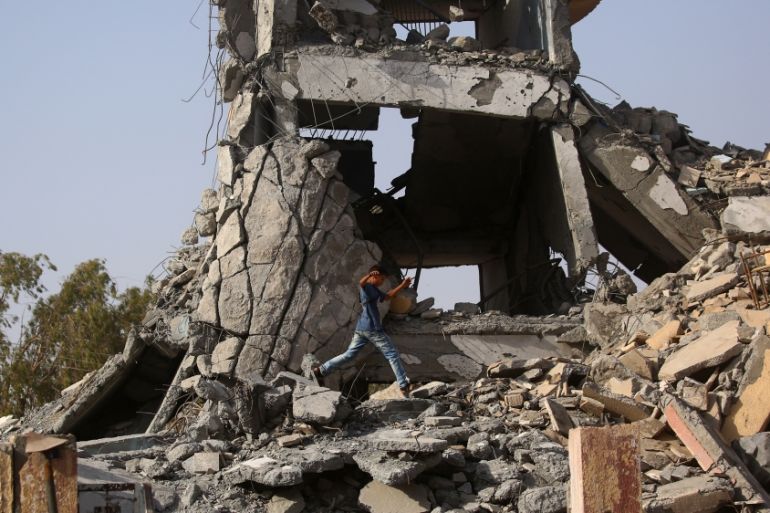Raqqa faces deadly ‘barrage’ from US-led coalition
Over 430 civilians likely died in August by US-led coalition actions in anti-ISIL push in Syrian city, says Airwars.

Every eight minutes last month, a bomb, missile or shell was fired on the Syrian city of Raqqa by a US-led coalition battling ISIL, resulting in at least 433 likely civilian deaths, according to a report released by a UK-based monitor.
Airwars, a group tracking civilian deaths in Russian and US-led coalition air raids in Syria and Iraq, said on Wednesday that the US-led forces dropped a total of 5,775 bombs, shells and missiles in support of an alliance of Kurdish and Arab fighters on the ground advancing into the city.
Keep reading
list of 4 itemsMoscow theatre attack suspects show signs of beating in court
Four men showing signs of severe beating charged over Moscow concert attack
Russia mourns Moscow concert hall attack victims as death toll rises to 137
“What we are seeing now is really a devastating coalition barrage on the city,” Chris Woods, director of Airwars, told Al Jazeera.
READ MORE: Battle for ISIL-held Raqqa city in ‘final stages’, says SDF
“More munitions were dropped on Raqqa in August than even during the heaviest fighting in west Mosul,” he added, referring to a major offensive to recapture the northern Iraqi city from ISIL earlier this year.
“And the effects on civilians trapped in the city have been equally devastating.”
Airwars said at least 433 Raqqa civilians likely died last month as a result of coalition actions, bringing the total since the anti-ISIL assault began on June 6 to more than 1,000.
|
|
According to the UK-based group, the majority of attacks have been conducted by the US, with support from its French, Belgian and British allies.
“This ferocious bombing by the US in the city is leading to significant civilian casualties,” Woods said, adding that the coalition has so far acknowledged only four deaths from two incidents since the beginning of the new military offensive to recapture Raqqa, ISIL’s self-declared capital in Syria.
‘Highest priority’
The coalition, according to its own estimates, has dropped at least 16,500 munitions in Raqqa and its surrounding areas since June.
It says it follows a strict and specific targeting process to minimise risks to non-combatants.
READ MORE: What will happen to Raqqa after ISIL?
In an emailed statement to Al Jazeera, the coalition acknowledged the deaths of at least 685 civilians in its attacks in Syria and Iraq since the start of its anti-ISIL operations in 2014 – but rights groups say the number is much higher.
“The avoidance of civilian casualties is our highest priority when conducting strikes against legitimate military targets with precision munitions, unlike the indiscriminate nature of ISIS tactics which result in an enormous number of avoidable civilian deaths,” the press office of the Combined Joint Task Force, Operation Inherent Resolve (CJTF-OIR) said.
Meanwhile, data released by the US Air Force show that during operations in August, more weapons were dropped in Syria and Iraq than any other month during the three-year campaign against ISIL.

Syrian activists say bombs dropped on Raqqa have flattened homes, destroyed hospitals and mosques, wiping out neighbourhoods of the ancient Syrian city whose residents have been living under ISIL’s brutal control since 2014.
More than 75 percent of the city is destroyed and more than an estimated 190,000 people have been displaced, according to activist groups and aid agencies.
“The coalition has made much of its precision munitions and that has played a role in reducing harm on civilian populations,” Woods said. “I think, though, that with these major assaults on urban areas, we are seeing the limits of precision warfare,” he added.
“The coalition likes to claim that this is the most precise warfare in history,” Woods said. “Precision tells you where the bomb goes, not what happens there after it’s landed.
“So when the coalition is dropping these bombs on heavily populated areas, it often has a devastating effect.”
Civilians caught in conflict
The US-backed Syrian Democratic Forces (SDF), a coalition of Kurdish and Arab fighters, now controls large swaths of Raqqa city, with ISIL’s fast-collapsing ranks confined to a small pocket in the city centre.
The SDF said on Wednesday that “80 percent of the city of Raqqa has been liberated”.
At least 20,000 civilians are believed to be trapped in Raqqa facing constant coalition bombardment, confronting ISIL snipers, with streets full of dead bodies, booby traps and landmines, making both living in the city and escaping from it difficult.
Last month, the UN urged for a humanitarian pause in fighting to allow civilians to leave, but that call was largely ignored.
“To our understanding, there has not been a pause,” Matthias Behnke, coordinator of the UN Human Right’s Syria team, told Al Jazeera. “Civilians have been prevented from leaving. ISIL has stopped them from leaving.”
“It’s quite complicated, the so-called Islamic State does not recognise UN conventions so establishing humanitarian corridors has been difficult,” she added, using a different name for ISIL, which stands for Islamic State of Iraq and the Levant.
“The civilians are caught between a rock and a hard place. They are used as human shields and are caught in the crossfire. Some of them have to bribe heavily to get out of the city and even when they could leave there is a question of protection.”
Airwars says that part of its data is drawn from the US, allied and Russian armies, “which is then cross-referenced against claims by local monitoring groups, media and social media of civilians reported killed”.
|
|